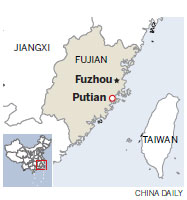

A decade ago, this backwater was a mess. But, thanks to smart planning, it now draws urban folk looking for a rural getaway
Houhuang village is picture of green fields, clean rivers, and ancient buildings with redbrick walls and red-tile roofs. Some are nearly a century old and used to serve as lookout towers for the Chinese Red Army.
Seen from on high, the buildings all resemble giant gems embedded on a green landscape.

The village, in Fujian province's Putian, is filled with tourists when we visit in early December. Some are enjoying barbecues, while others relax near a river. Everything seems peaceful under a blue sky.
"Beautiful mountains, fresh air, organic fruit and vegetables are among the highlights of Houhuang," says Xu Cong, the Party secretary of the village.
"It's a good place for urban folk to blow off steam, since it's close to the city."
The village is only a 20-minute drive from downtown Putian.
Houhuang, which covers an area of 1.5 square kilometers, has a population of roughly 1,000.
In the old days, many of its residents migrated to Southeast Asian countries such as Indonesia, Malaysia and Singapore.
Cai Chong was busy entertaining guests when we visited her lovely yard in the village.
She moved to the village from Putian's Hanjiang district and opened a vegetarian diner last year.
"I always wanted to open a vegetarian restaurant, so I shut my bar business when I heard there was an opportunity here," says Cai.
Her restaurant looks more like a garden. Guests come to chill out and eat after they are tired from walking around the village.
Cai fell in love with the place and the relatively slow lifestyle after she moved in.
"Every day, I wake up hearing birds chirp and smell flowers," she says.
"And the first thing I do is sip tea and watch the plants and the lake."
Cai wants her guests to feel at home in her yard. So, she lets them pick vegetables and get them cooked.
"They can help with preparing the food and even washing up."
Cai offers us tasty round dumplings that are springy and glutinous and steeped in sesame oil and honey. She even teaches us how to make them.
The woman is content with her life here. She loves interacting with guests and has staged events to promote turning waste into environmentally-friendly detergent.
Cai's restaurant is just one of the fun experiences visitors can enjoy in Houhuang.
They can also pick organic strawberries, wax apples, watermelons, lemons, oranges, tomatoes, pumpkins and pitayas at the fruit park.
An option for open-air cooking using old-fashioned kitchen tools and firewood is also available in the village.
For those who want to get their hands dirty, they can roll up their sleeves and plant seeds or catch loach in waterlogged fields.
For those interested in history, folk art and local traditions, the museums are worth exploring.
The folk art museum has 300 items, including local farming and textile production tools.
Other museums give visitors a glimpse of well-known local clans.
Meanwhile, you can see that Xu is proud of the changes in the village, and he has reason to be.
Everything was dirty and in chaos when Xu was appointed director of the village in 2006.
Animal feces and sewage were all over the place, he says.
So, Xu first asked every household to raise no more than five chickens and ducks and shut all the pig breeding sites.
"It was not reasonable to forbid locals from breeding fowls as every household had leftover food, which would otherwise be wasted," he says.
But, he ensured that locals took care of the animal waste.
"Also, if someone wanted to raise animals like pigs, they had to use a special facility that met government regulations."
In addition, Xu urged locals to sort out their rubbish to make waste treatment easier.
"For example, they were told to filter out kitchen waste before letting wastewater go down the drain," he adds.
Xu's efforts paid off.
Now, locals - from the elderly to children of five - pick up litter on the roads, he says.
A sewage system has been built to deal with wastewater and three years of efforts have yielded dividend.
Now a clean environment draws visitors to spend weekends and holidays in the village.
Xu knew that tourism was an effective way to transform the village. "But to do this, the locals had to get out of poverty, before a friendly neighborhood could be developed," he says.
Therefore, Xu established a rural cooperative and created job opportunities for locals, such as food plantation.
His measures worked.
Local income was a little more than 3,000 yuan ($440) a year in 2006. But it increased to more than 30,000 yuan a few years later.
Buildings in the village were also remodeled and turned into folk art centers and diners.
Xu is now planning to integrate the surrounding villages to form a greater Dahuang village resort.
He is unequivocal when he speaks about the future of the village.
The local ecology and rural elements are the key and won't be replaced or compromised, he says.
"We used red bricks and tiles to keep the original elements of the old buildings."
Recently, a celebrity reality show was shot in the village and it will be released next year.
"We expect it to bring in even more visitors", says Xu.
Contact the writer at [email protected]
|
Fujian province's Houhuang village has become a rural getaway for urbanites, with its proximity to the city, green fields, clean river and ancient buildings.Photos By Yang Feiyue / China Daily |